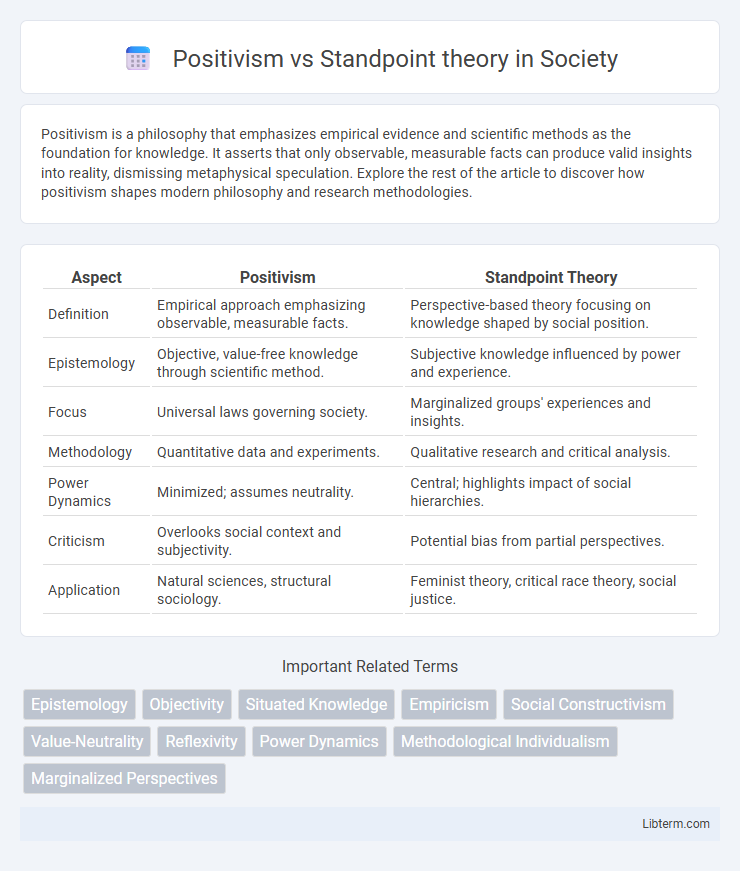Positivism is a philosophy that emphasizes empirical evidence and scientific methods as the foundation for knowledge. It asserts that only observable, measurable facts can produce valid insights into reality, dismissing metaphysical speculation. Explore the rest of the article to discover how positivism shapes modern philosophy and research methodologies.
Table of Comparison
| Aspect | Positivism | Standpoint Theory |
|---|---|---|
| Definition | Empirical approach emphasizing observable, measurable facts. | Perspective-based theory focusing on knowledge shaped by social position. |
| Epistemology | Objective, value-free knowledge through scientific method. | Subjective knowledge influenced by power and experience. |
| Focus | Universal laws governing society. | Marginalized groups' experiences and insights. |
| Methodology | Quantitative data and experiments. | Qualitative research and critical analysis. |
| Power Dynamics | Minimized; assumes neutrality. | Central; highlights impact of social hierarchies. |
| Criticism | Overlooks social context and subjectivity. | Potential bias from partial perspectives. |
| Application | Natural sciences, structural sociology. | Feminist theory, critical race theory, social justice. |
Introduction to Positivism and Standpoint Theory
Positivism asserts that knowledge is derived from observable, empirical evidence and scientific methods, emphasizing objective reality and measurable facts. Standpoint theory challenges this by highlighting how knowledge is influenced by social positions, particularly marginalized perspectives, arguing that objectivity is shaped by power relations and lived experiences. Together, these theories offer contrasting views on the production and validation of knowledge in social sciences.
Historical Origins and Philosophical Roots
Positivism traces its historical origins to the early 19th century with Auguste Comte, emphasizing empirical observation and scientific methods as the foundation of knowledge. Standpoint theory emerges from feminist epistemology in the late 20th century, rooted in social epistemology and critical theory, highlighting the importance of marginalized perspectives in shaping knowledge. Philosophically, positivism relies on logical empiricism and objectivity, while standpoint theory challenges this by asserting that knowledge is socially situated and influenced by power dynamics.
Core Principles of Positivism
Positivism centers on the belief that knowledge is derived from observable, empirical evidence and scientific methods, emphasizing objectivity and quantifiable data. It asserts that social phenomena can be studied with the same scientific rigor as natural sciences, seeking universal laws and generalizable facts. In contrast, Standpoint Theory highlights the importance of subjective experience and social positioning, arguing that marginalized groups offer unique and valuable insights into power structures.
Key Concepts of Standpoint Theory
Standpoint Theory emphasizes the importance of social positions and experiences in shaping knowledge, arguing that marginalized groups possess unique insights inaccessible from dominant perspectives. Key concepts include the situatedness of knowledge, which asserts that all knowledge is socially and historically situated, and the recognition of power relations influencing whose viewpoints are legitimized. This theory challenges Positivism's claim of objective, value-free knowledge by highlighting how epistemic privilege arises from lived experiences within specific social contexts.
Epistemological Differences
Positivism asserts that knowledge is derived from observable, empirical evidence and emphasizes objectivity and universal laws through scientific methods. Standpoint theory challenges this by arguing that knowledge is socially situated and shaped by the perspectives of marginalized groups, emphasizing the subjective and contextual nature of understanding. The epistemological difference lies in positivism's belief in detached neutrality versus standpoint theory's insistence on the value of situated, partial knowledge.
Methodological Approaches and Research Implications
Positivism emphasizes quantitative methods, relying on observable, measurable data to generate objective knowledge through hypothesis testing and statistical analysis. Standpoint theory prioritizes qualitative approaches, highlighting researchers' social positions and experiences to reveal power dynamics and marginalized perspectives. These methodological differences shape research implications, with positivism aiming for generalizable truths, while standpoint theory seeks contextualized understanding and social change.
Objectivity vs Subjectivity: A Comparative Analysis
Positivism emphasizes objectivity through empirical observation and scientific methods, asserting that knowledge must be based on measurable and observable facts. Standpoint theory challenges this by highlighting the importance of subjectivity, arguing that knowledge is shaped by social positions and lived experiences, which influence perspectives and biases. This comparative analysis reveals that while positivism seeks universal truths, standpoint theory advocates for contextual understanding shaped by diverse social realities.
Critiques and Limitations of Positivism
Positivism faces significant critiques for its heavy reliance on observable and measurable data, often neglecting subjective experiences and social contexts essential to understanding human behavior. Critics argue it overlooks power dynamics and marginalizes diverse perspectives, which Standpoint theory emphasizes by highlighting knowledge rooted in social positions and lived realities. The limitations of Positivism include its reductionist approach that excludes qualitative insights, rendering it insufficient for addressing complex social phenomena.
Critiques and Limitations of Standpoint Theory
Standpoint theory faces critiques for its potential essentialism, as it may overgeneralize the experiences of marginalized groups, risking stereotyping and ignoring individual differences. Critics argue the theory struggles with epistemic relativism, since it can suggest that all standpoints are equally valid, complicating objective knowledge claims. Limitations also include difficulties in defining clear criteria for evaluating and comparing different standpoints, which challenges the theory's practical application in research and social analysis.
Contemporary Relevance and Future Directions
Positivism remains influential in fields emphasizing empirical data and objective analysis, driving technological advancements and evidence-based policymaking. Standpoint theory gains traction in contemporary social sciences by foregrounding marginalized perspectives to challenge dominant narratives and promote inclusivity. Future directions suggest a hybrid approach integrating positivist methodologies with standpoint epistemologies to enrich research validity and social justice outcomes.
Positivism Infographic

 libterm.com
libterm.com